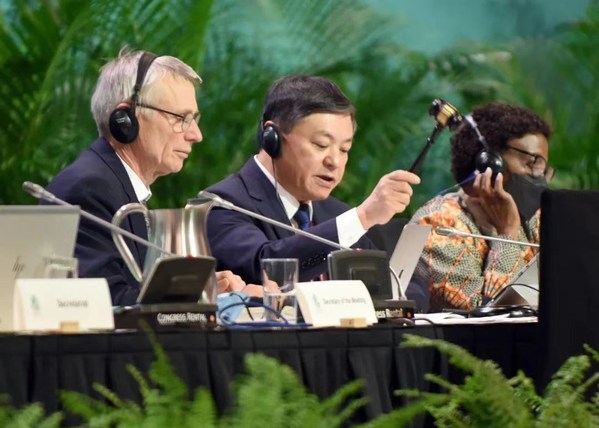BEIJING, Dec. 20, 2022 /PRNewswire/ -- A historic biodiversity agreement reached on Monday at the 15th meeting of the Conference of the Parties to the UN Convention on Biological Diversity (COP15) in Montreal, Canada.
"The package is adopted," the president of the COP15 and China's minister of ecology and environment, Huang Runqiu, declared at a plenary session in Montreal, sparking loud applause from delegates.
The biodiversity agreement, entitled Kunming-Montreal Global Biodiversity Framework, aims at reversing biodiversity loss and setting the world on path of recovery. It lays out four long-term biodiversity goals for 2050 and 23 specific "action targets" to be completed by 2030, covering three areas, namely, biodiversity conservation, sustainable use, fair and equitable benefit-sharing of genetic resources.
Key issues have been agreed by all parties. The most significant part of the agreement is a commitment to protect 30 percent of Earth's land and sea areas as protected areas by 2030, while so far, only 17 percent of terrestrial and 10 percent of marine areas are protected.
The agreement calls for raising $200 billion by 2030 for biodiversity from a range of sources and working to phase out or reform subsidies that could provide another $500 billion for nature. Besides, it calls for increasing to at least $20 billion annually, and by 2025 that money will go to developing countries, and by 2030, the number will reach $30 billion.
The framework also refers to synergistic conservation between biodiversity conservation and climate change mitigation and adaptation.
During the plenary session, delegates expressed the importance of putting aside differences and working together, and expressed their support for the framework.
As the presidency of COP15, China held the first phase of the meeting in Kunming, capital of southwest China's Yunnan Province, in 2021, and the second phase this year in Montreal, Canada, continued the theme of "Ecological Civilization: Building a Shared Future for All Life on Earth."
China has always attached great importance to biodiversity conservation and actively promoted the convening of COP15, which came after nearly four years of "marathon" negotiations and several delays due to the COVID-19 pandemic.
"Be it in overcoming the COVID-19 pandemic, or in enhancing biodiversity protection and achieving sustainable development globally, solidarity and cooperation is the only effective way to address global challenges," said Chinese President Xi Jinping via video at the opening ceremony of the high-level segment of the second phase of COP15 on December 15.
Even as negotiations ahead of the conference remain deeply divisive, China made every effort to bridge the gap, to chart the course of the negotiations, and finally to push for the conclusion of the framework as scheduled.
This framework is of historic significance as humanity seeks to build a healthy and prosperous global ecosystem and achieve the Sustainable Development Goals.













